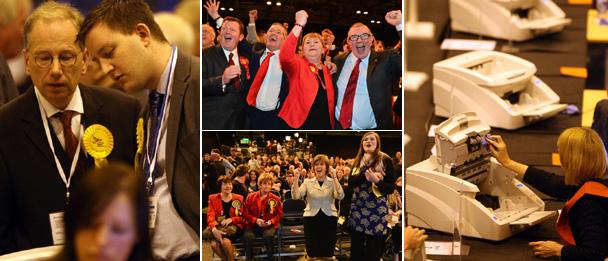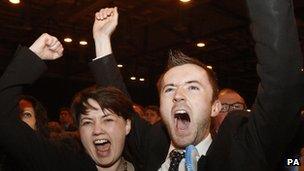Scottish council election: Council control talks get under way
- Published

The SNP and Labour each claimed victory but an outright majority was secured at only a handful of councils
Talks are under way across Scotland to work out who will form ruling administrations at most councils, following the 2012 elections.
The SNP gained most seats across the 32 authorities, but a strong Labour performance saw the party take control of Glasgow and become the largest party in Edinburgh.
Labour has an outright majority on four councils, while the SNP controls two.
But across much of the country, no one party managed to secure a majority.
Independents held on to Orkney, Shetland and Western Isles Council - Comhairle nan Eilean Siar.
It may take several days before it becomes clear who is in power in each of the 23 councils with no party in overall control.
The SNP has claimed overall victory in the elections based on updated projections of voting share.
According to the party's calculations, compounded from near-final data, the SNP just pipped Labour in popular support with 32.7% to 31.5% of the vote. The Conservatives are placed third on 13.3% and the Liberal Democrats fourth on 6.4%.
The SNP took the largest number of councillors.
Labour has also claimed victory and is in the lead in the largest number of councils.
The Liberal Democrat vote collapsed, with the most high-profile upset coming when Edinburgh leader, Lib Dem Jenny Dawe, lost her seat.
The Tories also lost seats, but the Greens boosted their tally to 14.
In Midlothian, where both the SNP and Labour had eight councillors elected, the nationalists have said they are on course to form an "historic" coalition after talks with Independent councillor Peter De Vink.
Labour has been in power, in some shape or form, in Midlothian for more than 80 years.
First Minister and SNP leader Alex Salmond says his party made more gains than any other party
Speaking on a visit to congratulate new councillors from Dundee and Angus, where the SNP claimed its historic first overall majorities, party leader Alex Salmond said: "On every indicator, the SNP has had its best ever council result.
"We have more councillors and more gains than any other party - doubling our seats advantage over Labour.
"We have become the largest party in more councils across Scotland - including our first ever overall majorities.
"And we also look set to have won the overall share of the vote in a local government election for the first time in our history."
Scottish Labour leader Johann Lamont has said she is not ruling our her party entering into a deal with the Conservatives to run Aberdeen City Council.
Labour become the biggest party there, with 17 seats to the SNP's 15.
Ms Lamont said the results made the party the largest group on 14 councils across Scotland, double that of the SNP.
She added: "From Dumfries to Aberdeen, from Inverclyde to East Lothian, in cities and rural areas, people are responding to Labour's positive message and determination to stand on the side of the people.
"We have doubled the number of areas where Labour has outright control of the council, but the voting system means that coalitions and partnerships will be formed.

Scots Tory leader Ruth Davidson was delighted the party's David Meikle retained his Glasgow seat
"Labour will work openly and inclusively with other parties, starting from the first principles of what is in the best interests of families, people and their local communities."
Scottish Conservative leader Ruth Davidson said her party had emerged from the elections as the third largest party of local government for the first time since 1992.
She added: "This means that Conservative groups will be pivotal in forming administrations across the country and we as a party will hold the balance of power in three of Scotland's six cities plus a number of other areas right around Scotland.
"Our local group leaders are empowered to make the best decisions for the people in their communities as they form coalitions and we know that an increased number of Conservatives having a big say in the running of council administrations will see better value for taxpayers' money while delivering better services across the country."
The results came after people went to the polls on Thursday, to vote for more than 1,200 councillors.
The SNP won 424 seats across Scotland, while Labour came second with 394, on a day when both parties increased their number of seats.
The Conservatives ended on a total of 115, down 16 seats, but the Liberal Democrats had the worst day out of the main parties, losing 80 seats to finish on 71.